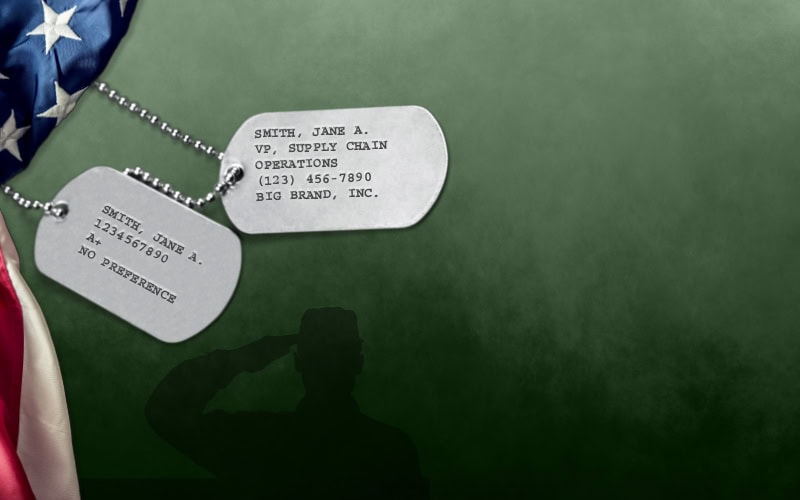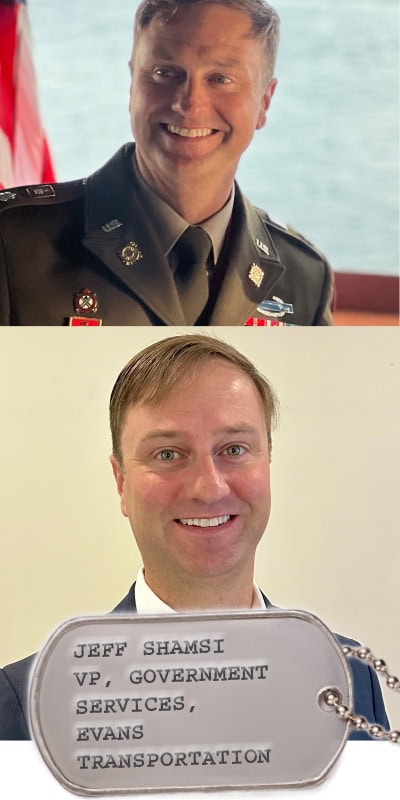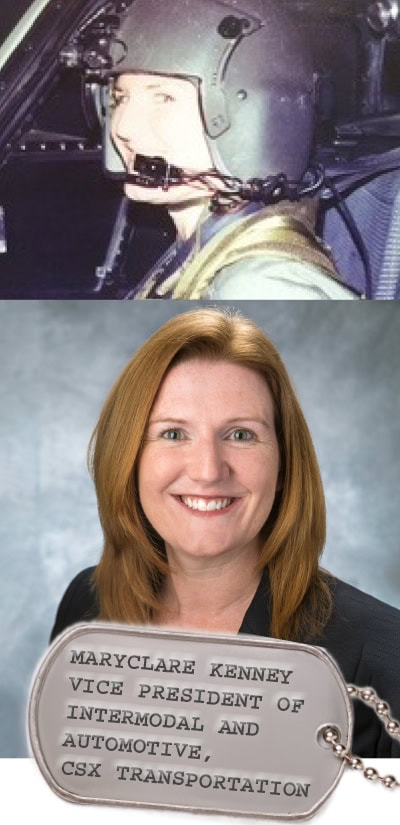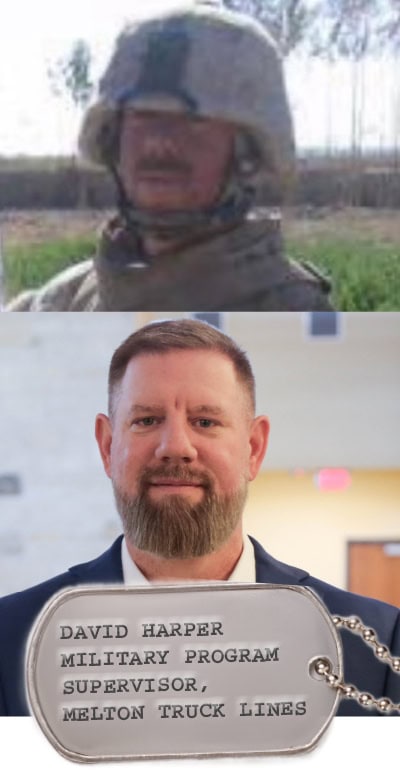Veterans Find a New Frontline in Logistics

Military veterans bring grit, leadership, and a mission-first mindset to the logistics sector, proving to be the secret weapon in solving today’s tough supply chain challenges.
As supply chains continue to face workforce shortages and evolving demands, many employers find that hiring veterans isn’t just the right thing to do—it’s a smart strategic move. Their background in leadership, discipline, adaptability, and systems thinking makes veterans well suited for roles in transportation, distribution, operations, and beyond.
Veterans often arrive with a mission-first mindset, the ability to perform under pressure, and a deep understanding of safety, structure, and continuous improvement. Additionally, flexibility and adaptability are key characteristics of both a successful supply chain and a military operation. Veterans know how to make adjustments to a plan under fire to accomplish the mission.
“If you look at veterans’ work ethic and ability to learn, and you’re willing to offer some training for the skill required in a job, you’ll get employees coming out of the service that will thrive in your organization,” says Brian Morgan, senior talent advisor with CSX Transportation, who joined the U.S. Navy at age 17 with parental permission.
Despite their qualifications, the transition from military to civilian work can be challenging. Veterans must translate military job codes into corporate skills, navigate unfamiliar hiring practices, and find employers who understand and value their experience. Additionally, veterans who joined the military right out of high school may never have put together a resume or interviewed for a job previously. That’s where programs like the Department of Defense’s SkillBridge, Hiring Our Heroes, and the Wounded Warrior Project come in—providing essential support to bridge the gap.
Evans Transportation, a logistics provider based in Delafield, Wisconsin, has found success using the SkillBridge program to offer internships to veterans transitioning to civilian employment.
“The program gives veterans exposure to the supply chain, our internal processes, and the value we bring to our partners,” says Phil Wenzell, chief network officer for Evans. “It’s a hands-on way for us to explore where their skills fit and for them to determine whether our industry is the right place for them after being discharged.”
While programs to hire veterans grab the headlines, retention can be challenging. Research shows more than 40% of vets leave their first post-military job within one year. That’s why Melton Truck Lines focuses as much effort on retaining truck drivers as it does on hiring them. Their veterans tend to stay on the job longer than the average driver, according to David Harper, Melton’s military program supervisor.
“Our veterans have a willingness to stay through the ups and downs, the hard times; they don’t shy away or back down from a challenge,” Harper says. “They’re willing to stick with it because they know that success and wins can come on the other side.”
To better understand how this transition plays out in the supply chain world, we spoke with three veterans who’ve successfully made the leap—and are now helping others do the same.
Taking Care of People—And the Mission
Jeff Shamsi – Evans Transportation
 Jeff Shamsi, vice president of government services for Evans Transportation, was a sophomore at the University of Florida during the September 11 attacks. That incident spurred him to add Army ROTC to his curriculum. Upon graduation, he was commissioned as a second lieutenant, and he served in Iraq as a rifle platoon leader.
Jeff Shamsi, vice president of government services for Evans Transportation, was a sophomore at the University of Florida during the September 11 attacks. That incident spurred him to add Army ROTC to his curriculum. Upon graduation, he was commissioned as a second lieutenant, and he served in Iraq as a rifle platoon leader.
While in combat, he gained an appreciation for logistics in a hostile environment. He stayed in the Army, taking command of a forward support company responsible for last-mile delivery to soldiers in the field.
“In the rifle platoon, we were at the last mile of delivery needing sustainment,” Shamsi says. “So, I decided to stay in the Army and deliver logistics in combat.”
He rose through the ranks, designing transportation and distribution networks for theaters of war, and concluded his military career at the U.S. Army Command and General Staff College, where he taught logistics to field-grade officers.
Shamsi made the transition to civilian life through the Army Career Skills Program and the Department of Defense’s SkillBridge Program.
Through the transition program, Shamsi created an executive fellowship with Evans Transportation, thanks to support from CEO Ryan Keepman and Phil Wenzell, chief network officer. The Department of Defense paid his salary during the experience. The fellowship allowed him to try working at Evans and for the company to evaluate him without any financial risk.
“At the conclusion of the fellowship, Evans offered me a job, and that seemed like the best place for me to flourish,” Shamsi says.
Shamsi used his experience in project management and organizational design to identify the need for a division at Evans to pursue government services contracts. He hopes to offer other veterans similar fellowship opportunities through the transition programs.
“I’ve learned over the years that if you take care of people, they take care of the mission,” Shamsi says.
While he gained ample knowledge about leadership and logistics along the way, perhaps the most critical ability he acquired through his military service was “being comfortable in the uncomfortable,” he says.
That, he adds, is a crucial skill for every professional in the the fast-paced, high-stakes world of logistics.
Bringing a Sense of Purpose to Civilian Life
Maryclare Kenney – CSX Transportation
 After finishing seven years as a pilot in the Army, Maryclare Kenney traded helicopters for trains. Today, she serves as vice president of intermodal and automotive for CSX Transportation.
After finishing seven years as a pilot in the Army, Maryclare Kenney traded helicopters for trains. Today, she serves as vice president of intermodal and automotive for CSX Transportation.
She participated in ROTC to help pay for college and became a Black Hawk helicopter pilot. Then, she earned her master’s degree and transitioned to a civilian career. After working for a large consumer packaged goods company for several years, she looked for a career with deeper meaning.
“The sense of purpose that I had in the Army was missing,” she says. “It’s not exactly the same as the military, but I do feel at CSX that we have an impact on the economy and the broader business world.”
She credits her military experience with preparing her for a position in the transportation industry.
“The leadership capability and what you learn about yourself in the military helps you push yourself to your limits,” Kenney says. “Without my military experience, I don’t think I’d be sitting where I am today.”
Leadership opportunities tend to arise earlier in a military career than they do in the civilian world, which fosters confidence from a young age.
“I was a 22-year-old platoon leader for a Blackhawk battalion. I signed for helicopters and had people working for me when a lot of my peers on the civilian side didn’t manage a team until five to 10 years later,” Kenney notes. “In the military, leadership is embedded in the experience. You step up and lead, and that translates for the rest of your career.”
Kenney is now the executive sponsor of CSX’s Military Business Resource Group, a forum that supports military members transitioning to work at CSX. She also volunteers with American Corporate Partners, helping to mentor veterans.
Military training translates well to transportation jobs and railroading in particular, Kenney notes.
“The safety culture in the military is similar to the railroad,” she explains. “We put people in positions where they have to be thoughtful about their surrounding environment. When it comes to those things, there are no excuses and there is no deviation.”
On the other hand, the transportation sector offers veterans an opportunity to fulfill their desire for a challenging career.
“People who aren’t in logistics may not realize how fast paced and interesting it is,” Kenney says. “No two days are ever the same for me.”
Helping Veterans Find Their New Identity
David Harper – Melton Truck Lines
 After 10 years in the U.S. Marine Corps, David Harper transitioned into the civilian sector. Today, he heads the military hiring program for Melton Truck Lines, a flatbed carrier based in Tulsa, Oklahoma.
After 10 years in the U.S. Marine Corps, David Harper transitioned into the civilian sector. Today, he heads the military hiring program for Melton Truck Lines, a flatbed carrier based in Tulsa, Oklahoma.
A self-described grunt in the Corps, Melton realized he had gained valuable and transferrable skills when his service was up.
“Even though I was an infantry guy, there were leadership aspects to my career, such as the ability to work with a diverse group of people,” Harper says. “I also was willing to get out there and find my way into a new industry.”
Initially, he thought a law enforcement career was the most comparable path to his military background and he even had an appointment to a state police academy. But after a few months of soul-searching, he decided that transportation would be a better fit.
After years of being away from home on deployments and training, the life of a long-haul trucker was not for him. Instead, Harper worked with trucking operations and safety before stepping into the military hiring program with Melton.
“All those detours led to where I found myself, and I love helping other veterans find their identity a bit sooner than I did,” Harper explains.
He puts his experience to work in his role at Melton, helping to hire veterans from diverse backgrounds. Some are former enlisted personnel, while others are officers or non-commissioned officers.
Today, approximately 30% of Melton’s drivers are veterans or currently serving in reserve and National Guard units. The company reports a notable reduction in turnover of military employees compared to non-veterans, which Harper credits to the resilience and dedication of veterans. The company’s retention initiatives include weekly military briefs, mentorship programs, and leveraging GI Bill benefits.
Harper also advises companies to connect with other veteran-friendly firms and local veteran organizations to build effective veteran programs.
“I give a lot of credit to Melton and its leadership—they truly understand what it means to be veteran friendly and have invested in the resources to support that,” Harper adds. “Once we hire someone and get them into their role, that support doesn’t disappear.”
